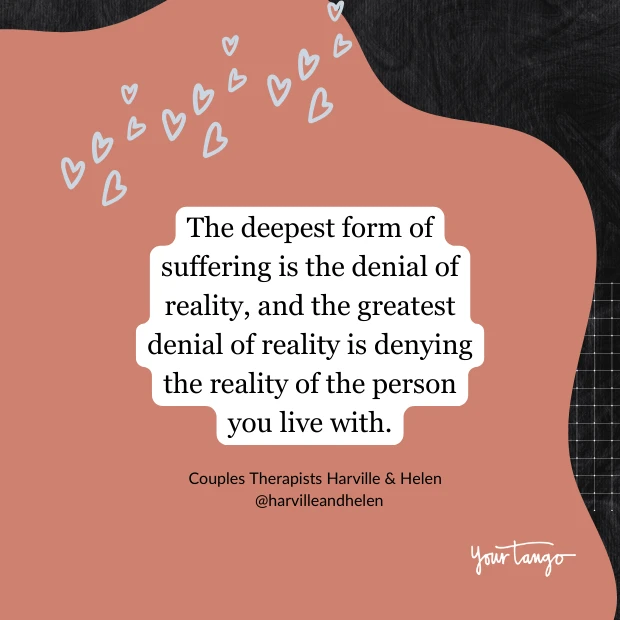If you are still waiting and wishing that your partner would see the light and behave as you think they should, then you are living a fantasy.
Idealizing a figment of our imagination — rather than living with and accepting the real flesh and blood person who is our partner — sets us up for failure.
Here's the common assumption that will throw a great relationship into a tailspin, says psychology:
We see our partners as what we think they are rather than seeing them as they are or as they see themselves.
And here’s the rub: when you remove the banner to “improve” your partner, you eradicate them. You wish for the real person to be gone and your image of them to take their place, and then you treat them accordingly.
Guess what? That’s also what your partner does to you! A study in the Journal of Personality and Social Psychology suggests why you wonder why your relationship isn’t going so well now that the euphoric stage of romantic love has passed.
If this sounds familiar, we invite you to take a journey of discovery. Engage your partner with curiosity and surrender judgment. You may discover a whole new, amazing world.
Your partner is an “other,” with a whole world inside that you cannot fully enter or change. You may want sameness — for your partner to be just like you or your ideal image — but that won’t happen.
If you want a great relationship, you must let your partner be.
Your frustration with your partner is an objection to them being their true self. It is an objection to their reality, to the fact they are not like you, that they do not fit your idealized picture.
Let’s be honest: Your frustration is a denial of reality.
The most profound form of suffering is the denial of reality, and the greatest denial of reality is denying the reality of the person you live with.
Your partner will always strive to be who they are, even if they're trying to fit into your image. If your partner tries to deny themselves, they will eventually become angry or depressed, as shown by a study in Personality and Social Psychology Bulletin. That wish for sameness is the source of difficulty in living with another person.
Differences are our reality.
- Your partner has an inner world that is different from yours.
- Your partner’s feelings are different.
- Your partner’s thoughts are different.
- Your partner’s temperament is different.
- Your partner’s desires are different.
- Your partner’s childhood was different.
- Your partner is not you!
 Olena Yakobchuk via Shutterstock
Olena Yakobchuk via Shutterstock
Practice simple acceptance:
- Ask: “Why do they do that?” “Why do they feel that way?”
- Ask what it is like to live in your partner’s skin.
- When you judge your partner, they cannot help but become defensive.
- You have taken the first step toward intimacy when you approach them with curiosity.
In the early romantic stage of your relationship, you felt inseparable, as though you were so much alike. You knew all of your needs would be met in this relationship. An article in the Hellenic Journal of Psychology helps show how, in the second stage, you experience conflict. You disagree and fight. Your partner wants things you don’t.
How could this be? Who is this person? You try to get your partner to see things your way and behave as you wish. You criticize, shame, and blame, all to coerce them into being who you think they should be. But, as a study from Brigham Young University suggests, they become defensive and distant.
This process will only escalate until the relationship is torn apart. Before you know it, you are leading parallel lives, and the prospect of divorce has raised its ugly head. This doesn’t have to happen.
You long to love your partner, and they long to love you, but you have become separate. Trying to create sameness will not get you there; learning to accept and honor your differences will.
In a healthy relationship, you realize you live with another person who is not an extension of you.
Your partner is a unique individual with an equally valid point of view. When you learn to love those differences that you now find so annoying, you have entered the realm of mature love.
Harville Hendrix, Ph. D., is a couples therapist with over 40 years of experience as a counselor, educator, clinical trainer, author, and public lecturer. He has received many awards for his work with couples. He and his wife, Helen LaKelly Hunt, co-created Imago Relationship Therapy, a therapy for couples now practiced by over 2,200 certified therapists in 30 countries.
This article was originally published at Harville & Helen. Reprinted with permission from the author.



